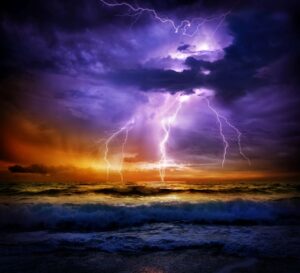Can a Storm Damage Your HVAC Unit?
 North Carolina has some of the most beautiful weather, which is why so many people choose to live here. With breathtaking scenery from the mountains to the coast and in between, Tarheel residents consider themselves fortunate that weather-related events do not occur that often in our state.
North Carolina has some of the most beautiful weather, which is why so many people choose to live here. With breathtaking scenery from the mountains to the coast and in between, Tarheel residents consider themselves fortunate that weather-related events do not occur that often in our state.
Weather elements can damage or destroy HVAC units despite their strength, durability, and reliability. When you need emergency HVAC repair, All American Heating, Air, and Plumbing professionals will respond quickly and reliably.
The Atlantic Hurricane Season runs from June 1 to November 30, with the most active months for North Carolina being August, September, and October. We are vulnerable not only to hurricanes but also to the effects of severe weather from tornadoes, flooding, thunderstorms, hail, and power outages. Homeowners and their property are at risk of damaging weather events if they aren’t fully prepared.
Mother Nature, also known as Mother Earth, is a guiding force who occasionally likes to shake things up. When she comes calling, preparation is essential to protecting your home and property.
What Happens When Mother Nature Comes Calling?
Your home’s HVAC system provides year-round comfort and convenience, but it also must withstand the elements. The outside condenser of your system is vulnerable to weather-related debris getting caught in the coils or other important parts.
Along with any physical damage to your unit, your system should be checked if the system won’t turn on, you’re hearing strange knocking or banging noises, experiencing power surges, a burning odor or the unit has a reduced cooling capacity.
Let’s look at a few HVAC weather-related issues that can cause damage and require an emergency HVAC repair.
Heavy rain and flooding: when these events occur, your outside condenser is at risk for excess water accumulation. If your outdoor unit is located in a low-lying area that lacks proper drainage, you could be facing issues with the electrical components, control boards, capacitors and other vital HVAC parts.
Hail Damage: When it comes to hail damage, your HVAC system may become the brunt of that nasty little golf ball-like precipitation. You may notice visible dents or bending of components (condenser coil fins), but there are other non-visible issues to watch for, including unusual sounds, reduced cooling performance, and increased energy bills.
Lightning Strikes: When Mother Nature lights up the sky, it can look quite daunting to see. These destructive forces can also have a significant impact on your HVAC’s electrical system, control board, and other internal parts. If a strike occurs near or around a building, the increased electrical energy can cause severe damage. If your HVAC doesn’t turn back on after a power loss, it could mean the equipment may have sustained damage from a power surge, requiring an emergency HVAC repair.
High winds: This can cause dirt and debris to accumulate inside your HVAC unit, resulting in a type of “dust” which filters inside. For allergy sufferers, these harmful air pollutants mean poorer air quality to breathe in. If you notice a “musty smell,” it could be the result of dust buildup on the HVAC coils, necessitating an emergency HVAC repair to clean the ducts and improve clean airflow.
All American Heating, Air, and Plumbing
At All American Heating, Air, and Plumbing, we are available when you need us, in good or harsh weather. We are your hometown team for HVAC sales, service, and maintenance. Customers have relied on us for over 25 years, and we are ready to assist you whenever the need arises.